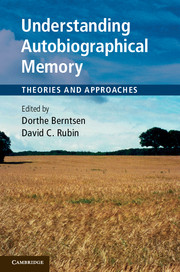Book contents
- Frontmatter
- Contents
- List of figures
- List of tables
- List of contributors
- Preface
- Acknowledgements
- 1 Introduction
- Part I Approaches to the study of autobiographical memory
- Part II Neural studies of autobiographical memory
- Part III Social and cultural aspects of autobiographical memory
- Part IV Development of autobiographical memory from infancy to old age
- Part V Evolution and basic processes of autobiographical memory
- 14 Evolutionary origins of autobiographical memory: a retrieval hypothesis
- 15 Spontaneous recollections: involuntary autobiographical memories are a basic mode of remembering
- 16 Autobiographical memory and future thinking
- Part VI Discussion
- Index
- References
14 - Evolutionary origins of autobiographical memory: a retrieval hypothesis
Published online by Cambridge University Press: 05 November 2012
- Frontmatter
- Contents
- List of figures
- List of tables
- List of contributors
- Preface
- Acknowledgements
- 1 Introduction
- Part I Approaches to the study of autobiographical memory
- Part II Neural studies of autobiographical memory
- Part III Social and cultural aspects of autobiographical memory
- Part IV Development of autobiographical memory from infancy to old age
- Part V Evolution and basic processes of autobiographical memory
- 14 Evolutionary origins of autobiographical memory: a retrieval hypothesis
- 15 Spontaneous recollections: involuntary autobiographical memories are a basic mode of remembering
- 16 Autobiographical memory and future thinking
- Part VI Discussion
- Index
- References
Summary
The evolutionary origins of autobiographical memory (AM) are a challenge for evolutionary cognitive science. The search for a theory is complicated by theoretical biases regarding the special nature of human memory, which seems so different from its primate predecessors. Why is it so different? How did human memory evolve, and where does AM fit into an evolutionary theory of human memory?
This chapter focuses on the evolution of one key feature of human memory: voluntary retrieval, or recall. Human memory is special in many of its superficial manifestations, but, from an evolutionary standpoint, its major distinguishing feature is the ease with which its contents are made accessible to consciousness. The evolution of voluntary conscious access to memory may account for many, if not most, of the distinguishing characteristics of human memory. The unique human capacity for accessing our memory banks provided a platform on which the spiraling co-evolution of human cognition and culture could be constructed.
The distinctiveness of human memory
Human memory researchers use a distinctive vocabulary to describe the memory systems of the human brain. It does not correspond to that used to describe animal memory. For example, in the extensive review edited by Kendrick, Rilling, and Denny (1986), no animal equivalents of semantic or episodic memory were mentioned, and the focus was on a monolithic concept of “long-term memory,” as if no further distinctions were needed. Does this difference in terminology imply that the distant ancestors of modern humans must have evolved one or more radically new long-term memory systems?
- Type
- Chapter
- Information
- Understanding Autobiographical MemoryTheories and Approaches, pp. 269 - 289Publisher: Cambridge University PressPrint publication year: 2012
References
- 19
- Cited by



